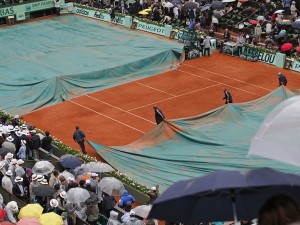Rain stops Nadal, Djokovic in French Open final

Stadium employees cover center court as the mens final match between Rafael Nadal of Spain and Novak Djokovic of Serbia was suspended because of the rain at the French Open tennis tournament in Roland Garros stadium in Paris, Sunday June 10, 2012. AP/CHRISTOPHE ENA
PARIS – With his big lead over Novak Djokovic in Sunday’s drenched French Open final slipping away, Rafael Nadal tossed a soaked, clay-smeared tennis ball toward the chair umpire.
A drizzle was now a downpour, making the balls heavy, the clay court slippery and changing the complexion of a match with so much at stake: Djokovic’s bid to become the first man in 43 years to win four consecutive Grand Slam titles, and Nadal’s attempt to become the first man to win seven titles at the tournament.
Article continues after this advertisementMoments later, play was suspended with the No. 2-seeded Nadal trying to protect a 6-4, 6-3, 2-6, 1-2 lead over a surging Djokovic, who’s seeded No. 1. A tarp was pulled over the court, and after another hour or so, the decision was made to stop for the day and resume Monday.
Yes, this French Open already has made history, but not for a reason that was expected: It’s the first time since 1973 that the tournament at Roland Garros didn’t conclude on a Sunday.
This sort of thing is becoming a regular occurrence at tennis’ top tournaments: The U.S. Open men’s final has been postponed from Sunday to Monday each of the past four years because of rain. Unlike at Wimbledon and the Australian Open, neither the French Open nor U.S. Open has an indoor court available for tournament play; there is a plan to have a retractable roof in Paris five years from now.
Article continues after this advertisementNadal and Djokovic were scheduled to resume at 1 p.m. local time (7 a.m. EDT) on Monday, when the forecast calls for intermittent rain. NBC, which aired Sunday’s action, said Monday’s U.S. TV coverage will shift to NBC Sports Network, a cable channel in about 35 million fewer homes than the broadcast network.
Toni Nadal, Rafael’s uncle and coach, said he thought action should have been suspended earlier Sunday because “the court was too wet.”
After the Nadals left the premises for the evening, Djokovic followed, pausing to chat with Los Angeles Lakers forward Pau Gasol in the players’ lounge. Not surprisingly, Djokovic’s mood was considerably better than it was during the second set, when he was unable to counter Nadal’s clay-court brilliance.
Already down a set and serving at 3-3, 30-15 in the second, Djokovic sailed two forehands long to hand a break point to Nadal, who converted by ending an 18-shot exchange with a forehand winner down the line. Djokovic lowered his head, shook it, and slapped his thigh. Arriving at the changeover, he cranked his racket and whacked his green sideline bench, sending a chunk of the furniture flying; a ballkid ran out on court to gather the debris. The impact was as loud as a metal door slamming shut, and spectators jeered and whistled, a derisive reaction that grew louder when Djokovic walked back out on court for the next game.
A game later, with Nadal ahead 5-3, the match’s first rain delay arrived. When play resumed about 35 minutes later — with a fully intact replacement bench for Djokovic — Nadal quickly wrapped up the second set by breaking with a full-sprint, cross-court backhand passing winner, then charged to a 2-0 lead in the third.
That made Nadal 20 for 20 in sets over the tournament’s two weeks, and the title appeared near. But Djokovic is not the type to go quietly. This is a guy, don’t forget, who saved two match points against 16-time major champion Roger Federer in last year’s U.S. Open semifinals, then saved four more against Jo-Wilfried Tsonga in the quarterfinals in Paris.
So right when all seemed lost for him, Djokovic grabbed the momentum and wouldn’t let go. He began hitting out more, trying to end points quickly, and it worked. For 50 rub-your-eyes minutes that were sublime for Djokovic and ridiculous for Nadal, the Serb took eight consecutive games to collect the third set and open the fourth 2-0.
Clearly, Djokovic dealt much better with the conditions — consistent, heavy rain that left both men using their rackets to knock caked clay from the soles of their shoes. Sliding on the court was tougher. Nadal couldn’t apply his usual heavy topspin on shots. Normally unflappable, particularly at his favorite tournament, the Spaniard began to gesture and mutter between points.
Finally, Nadal put a stop to Djokovic’s run by holding serve to win a game that made it 2-1 in the fourth set. That’s when the second delay began, after 3 hours of playing time. They did not return to the court; when the postponement was announced to the remaining fans in the stands, some responded with boos.
Tournament referee Stefan Fransson said Djokovic told him the court was slippery, and Nadal was “not happy” while pointing out his complaints about the balls.
Nadal and Djokovic will return Monday, surely hoping they’re not subjected to what happened 39 years ago, the last time the French Open stretched beyond Sunday: Ilie Nastase’s victory over Nikki Pilic in the 1973 final ended on Tuesday.